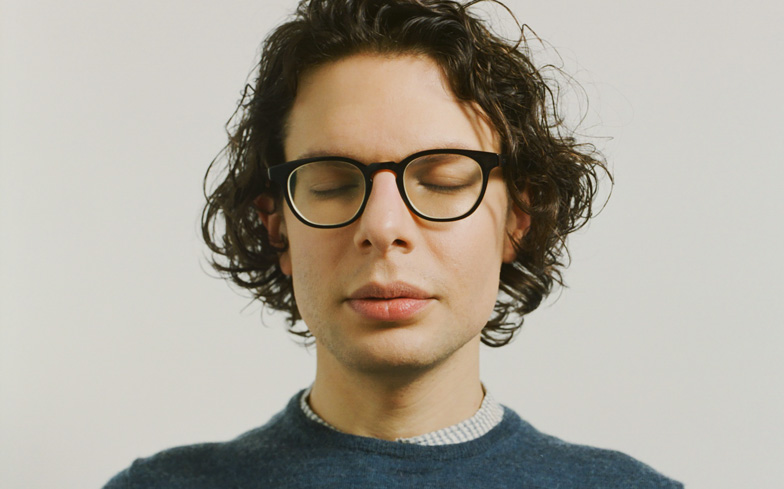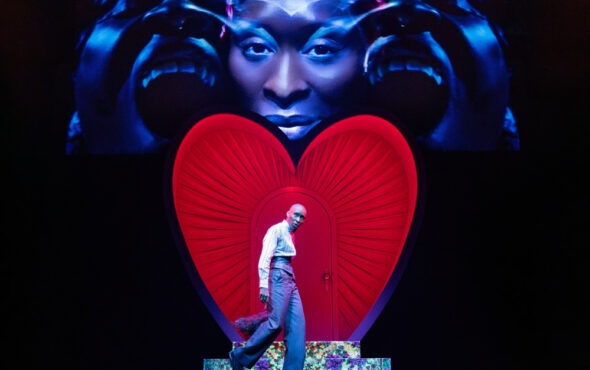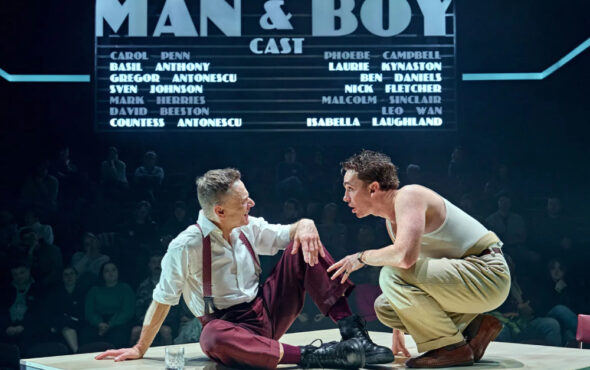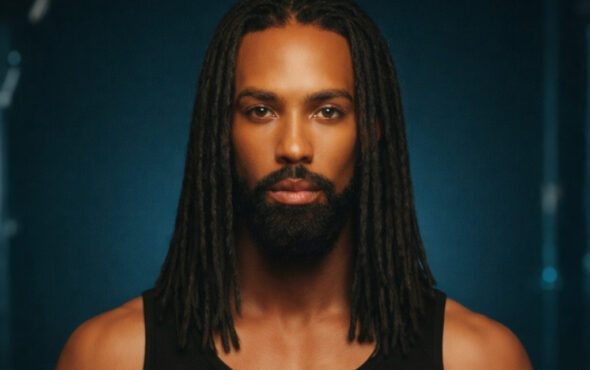
For many of us, our childhood is a wonderfully happy and somewhat simpler time. For others, it’s a period that still, to this day, presents all manner of problems.
Be it emotional or mental, it’s not how we fight against these issues, but how we learn to cope with them, that makes us the person we are today – and that’s just what Simon Amstell is doing.
A regular and favourite face of the comedy world, the former Popworld and Buzzcocks presenter is used to having audiences and fans adoring him – but is that really ever enough?
With the release of his book HELP, Simon looks to delve back into his younger life and the many experiences from then through now to find out how they carved the man he is today. Mixing great humour with pages of brutally honest encounters with his filterless feelings, HELP is an outsiders look into the world he’s kept locked away for so long.
Related: Bella Thorne says she has lost auditions since being open about her bisexuality
Why did you want to write your book HELP?
The original motivation was not being able to resist the thought of the transcripts of my stand up shows being published, feeling embarrassed about that egomania, and saying that I could expand on what I’d written in standup before. So the book is bits of stand up, and then all the sad stuff in the jokes.
Was it exposing being so open in a different way with this book, with the personal and serious side of it?
I do at least, at the time, think I’m giving everything I could possibly give as long as I can find a way to make it funny. The book felt more exposing and more vulnerable as a thing to do in that I was writing stuff which wouldn’t necessarily be funny. I would write whole paragraphs that I knew wouldn’t be funny and if comedy is your defence mechanism then that’s scary… and it better be interesting because if it’s not funny, then it better be really interesting, and really brutally honest… otherwise it stinks.
Was writing parts that are interesting, but perhaps not funny, exciting because it’s something different from you?
It was incredibly vulnerable, but it felt like an expansion of what I’m up to generally. It’s not like I’m a comedian who talks about…
Sex?
Well maybe I am one of those. I’m not an observational comedian that’s talking about the mundanity of life generally, I am talking about the things that are meaningful and upsetting to me on stage, so when it came to expanding on that in the book, it felt like a natural expansion. Normally I talk about dogs and then I’m going to talk about my . parents. I’ve always spoken about my parents, just here’s some more of that.
Was there anything you wrote about from a slightly more serious level that you’d always wanted to speak about in comedy but never could?
I tell you what as it’s Gay Times… I’d always attempted to and succeeded at living my life as somebody who happens to be a boy who likes boys, and my sexuality doesn’t really explain much further than that. In terms of my career, I never wanted it to be the most interesting thing about me. I didn’t want it to be the headline. I’m still living like that and I still think that was quite a good move, but I think that what was missing from that was an honouring of the child who had to pretend to be a different person until he was 21.
What I realised through writing the book was that it wasn’t something to have to lie to everyone about, including myself, for such a long period of time – during such a difficult time anyway for anyone going through puberty and becoming some kind of adult. It was a very healing thing to do; go in and look at that time in a way without censoring myself. I think I’d resisted looking at that time because I thought that if I do, it’ll be kind of old fashioned to talk about it. We’ve heard this story; we know about this. I’d rather transcend the label than bang on about it. I didn’t know if having excavated it all, if I’d still include it in the final version of the book, but I felt good at having done the excavation. One way that I feel good at the thing I’ve done and it can be shared with the world is that it could have been useful to my 13-year-old self, and that’s partly why the book is called HELP as it was a help for me, and might be a help for other people.
It hasn’t ever felt like you hid your sexuality at all throughout your career.
No. As soon as I knew, everyone knew. It was a month into working on Popworld on Channel 4, and when I found out. I told everyone. I went and told everyone.
Related: Trinity The Tuck on Valentina’s elimination and Drag Race UK
Do you think that if you were a comedian who had their sexuality as a bigger part of your public image, the jobs you’ve had would have been different?
My odd career trajectory is to do with my fear of repeating myself and disappointing people, so what I tend to do over the years is do something until it’s generally perceived to be successful and brilliant, and then I will leave that thing before anyone can change their mind. I’ll then want to do something different so that means there’s been everything from a pop music show to a situational comedy to stand up tours and films and a feature film. I get quite bored and there’s other stuff I can do and if I stay where I am, I won’t be able to do those things.
Have you had experiences where people have said they’ve connected deeply with something you’ve discussed?
Yeah. I used to talk about being lonely quite a lot. I don’t do that as much, and I used to get a load of lonely people coming to the show which isn’t ideal for ticket sales as you only get one ticket sale, but there was a lot of hugging and I wasn’t really ready for hugging in my life. I didn’t realise but at that time in my life, I was terrified of intimacy so there would be these people who would really needed a hug and thought I would be one to give and receive that hug.
Is intimacy with random strangers something you do finally feel comfortable with?
The film that’s coming out in March (Benjamin) is that terror of intimacy, that inability to receive love and believe you deserve it. The film really is about someone who thinks he really has to do a lot of stuff and put on a whole show in order to receive love and eventually realises that he’s enough without any of the razzle dazzle. I just said razzle dazzle.
How much of that narrative is from your own life?
Oh, yeah. Everything that I ever do, even if it’s fiction, it’s coming from very real emotions. If I write something and it doesn’t feel like… or I’m not sure if it’s something that’s not true or seen in another film. If I’ve experienced it and felt it, I can direct the actors and I know what I’m waiting for when watching the scene play out. Otherwise, it’s general and won’t connect with anyone. It’ll just be like wallpaper.
Do you enjoy when people have specific parts of your career that they enjoy most? Either Popworld, Never Mind the Buzzcocks or any of your other projects?
No, that’s my favourite when it’s a specific thing. I feel heard and I feel like there’s a connection that’s happened there. Even something as silly as interviewing Tweet, it came from somewhere within me.
Related: Reclaiming the word ‘queer’: what does it mean in 2019?
It is iconic.
Well thanks! It comes from somewhere within me and it feels connection. If you think of all the things that can get in the way of what you have in your soul getting through a screen and into somebody else’s. There’s so many bits of machinery in between, but I like that.
What was it like interviewing Tweet for Popworld in that way? (And if anybody has no clue what we’re talking about, it’s on YouTube. Go watch.)
I think it was really fun. It was a lot of pressure every week because there was a point where I really felt like people liked the show and I thought I didn’t know how much longer… it always feels like everything is a story. So the narrative is: ‘We like this show’. There’s only so long that can be the story until: ‘I used to like that’. There’s a point you achieve all the success you want. The show is like this really beautifully functioning organism. It’s come alive in just the right way; it’s alive now. You then worry that at some point it’ll die. How long until it dies? And then you’ve got to get out before it dies.
Do you think about or have you ever been asked to bring Popworld back?
No, but I’m 39. It’d be insane for me to be talking to the people now. I don’t think I’d know who the people are.
Dua Lipa? Hello?
“First of all, tell me about yourself. It’s lovely to meet you.” I keep going. I keep going forward. The other thing is that it almost become too easy when you were mentioning the Tweet thing. That’s the point where we knew how to do something, and then it became too easy and I think that I have to find something harder to do. So it’s got to a point where it’s direct a feature film which is really hard. Maybe in 40 years I’ll know how to do that? And then I’ll die.
And then you’ll want a new challenge like running for PM?
No. God. No. I think there’s some things that are just wrong.
Thinking about those kids that watched you on television as an openly queer person. Did you feel a responsibility to them?
Everything I’ve ever done has been, on some level, reaching out a hand to my 13- year-old self and telling him that he’s okay. The whole… everything. That’s just there all the time and I think about the people who did that for me. I have a lot of appreciation.
Do you think there is a line in comedy for offence? Is a joke always just a joke?
I don’t like the word offence. For me, when people say they are offended, I think what they’re scared of saying is that they’re upset and that’s the more vulnerable thing to say because you’re angry. ‘I was offended by that man.’ It should be, ‘I felt scared. It hurt something deep within me when I heard you say that’. There’s a conversation to be started there. That would lead to, and if you need an apology, the sort of sentence that leads to somebody saying, ‘Oh my goodness, I’m so sorry’. Anger is only a defence mechanism against hurt. I think what I’m into is people expressing their feelings in as trustful and vulnerable way as possible. If that’s the person who feels hurt or the person who did something they now regret.
What do people get from HELP?
What do they get? They get lots of laughter hopefully coming out of their faces. You want laughter to come out of your face? Buy this book. They could cry a bit as there’s some emotionally difficult moments in it. I think it’s a coming-of-age story. A story of somebody who struggled with anxiety, depression, his identity and thinking that those things didn’t mean to be addressed as long as people were… as long as people were applauding. At some point, through the second half, there’s the various ways that I got in contact with who I actually am and got the root of my depression. I think what you might get from it is a connection to your younger self – I think that’s why I got from it. For me, who I’d abandoned because I had no need and was a bit embarrassed by him. There was a reuniting of me and my 13-year-old self that happened with this book, and that might happen with you if you are also older than 13 – but I can’t guarantee anything. I’m just a clown.
More information on Simon can be found here.








